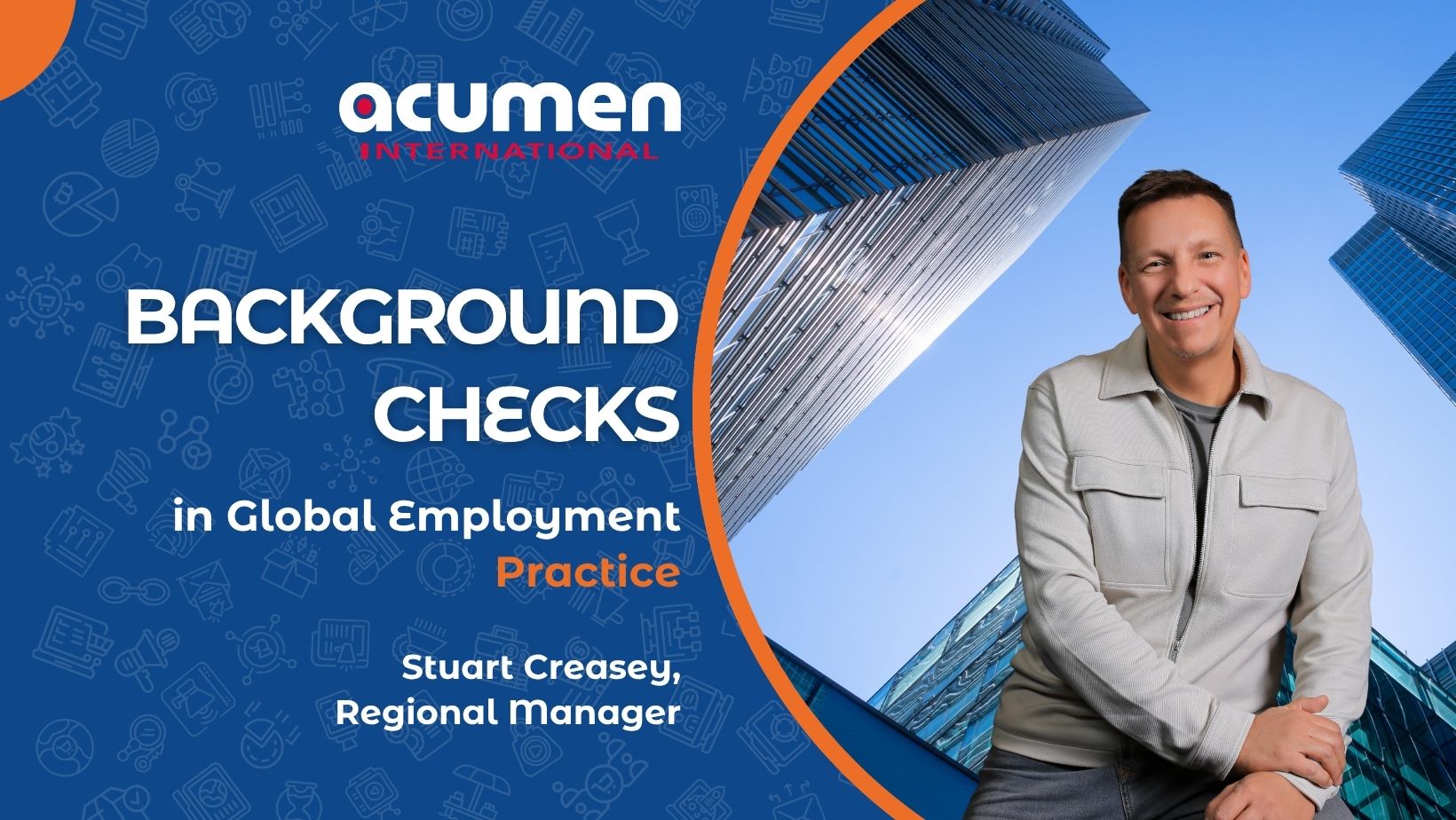By Stuart Creasey, Regional Manager at Acumen International
In international hiring, background checks define how far an employer can go to verify the truth without crossing legal or ethical lines. Employers want assurance that the people they bring on board are who they claim to be and can be trusted with sensitive responsibilities.
Yet in global employment, what appears to be a simple verification step is in fact a legally and culturally complex exercise.
Across jurisdictions, governments and regulators restrict certain types of background screening not to burden employers, but to protect fundamental human rights — privacy, equality, and dignity at work.
Each country defines its own threshold for what information may lawfully be collected, how it must be handled, and when it becomes excessive or discriminatory.
For companies hiring across borders, and especially for Global Employer of Record (EOR) providers, understanding these boundaries is not about avoiding penalties. It is about respecting the values that underpin modern labour law: that people should be judged by competence and conduct in the present, not by irrelevant or private details of their past.
This article explores how background checks operate under global employment models, why their scope differs from country to country, and how responsible employers can maintain due diligence while honouring the individual rights that international law exists to protect.
Understanding the Legal Nature of Background Checks
A background check is a form of pre-employment due diligence. It confirms information that is relevant to a hiring decision and helps ensure trust between employer and employee.
Because it involves processing personal data, it must always rest on a lawful basis and a proportionate purpose.
The legitimate aim is to protect the organisation and its clients, not to intrude. Most legal frameworks distinguish between verification that is relevant to the job and information that would breach privacy or equality rights.
Typical elements include:
- Identity and employment verification — confirming that documents and work history are genuine.
- Professional licence or qualification checks — required for regulated or technical roles.
- Criminal or financial record enquiries — only where national law allows them and the role justifies the risk assessment.
Every country defines these limits differently. Some require the candidate to obtain a police or judicial certificate personally; others permit employer-initiated checks through authorised agencies.
Many European systems apply the principle of data minimisation: only what is necessary for the decision may be processed, and it cannot be reused for other purposes.
In an Global Employer of Record arrangement, the EOR, acting as the legal employer, manages these checks within local law. It commissions them through accredited providers, ensures lawful data handling, and maintains the compliance record. The client may specify the level of assurance it needs, but legal execution and accountability sit with the Employer of Record.
Background screening, done correctly, is not an administrative checkbox, but a regulated process balancing two interests: workplace integrity and individual rights.
Main Types of Background Checks in Global Employment
1. Identity and Right to Work
Every compliant hire begins with confirming who the person is and whether they can legally work in the country of employment. These checks, based on passports, national IDs, or work permits, are mandatory in most jurisdictions and form the foundation of compliant onboarding.
2. Employment and Education History
Verification of a person’s professional background aims to confirm experience and qualifications, not to investigate character. Employers must stay within the principle of proportionality: only information relevant to the role should be collected and verified. In most cases, this involves confirming dates, positions, and credentials directly with prior employers or institutions.
3. Criminal Record
This is among the most sensitive forms of screening. Some countries permit access to official records through government channels, while others restrict it to specific roles of trust or require the individual to obtain the certificate themselves. The legality and scope of criminal record checks depend entirely on local law, the level of responsibility, and the relevance to the role.
4. Credit and Financial Standing
Financial background checks are allowed only where financial responsibility forms part of the job. In most countries, credit screening for general staff is viewed as intrusive and may be banned or strictly limited. Where permitted, employers must show a clear link between the check and the position’s fiduciary duties.
5. Professional Licences and Certifications
In regulated sectors such as medicine, law, or finance, confirming that a professional licence is valid and current is part of due diligence. These checks are normally straightforward, provided they are conducted through recognised authorities and limited to the specific credential required.
6. Health and Medical Fitness
Health screening is lawful only when it serves a legitimate purpose, such as workplace safety or determining a person’s ability to perform essential job functions. General or speculative testing is widely prohibited because it can expose personal or protected medical data.
7. References
Reference checks remain one of the most widely used forms of background verification. Their value depends on factual accuracy and relevance, not opinion. Employers should collect them with the candidate’s consent and ensure that questions relate directly to professional performance.
8. Public Information and Online Presence
Reviewing a candidate’s public profile or online activity is becoming more common but carries a high risk of bias or overreach. Only job-relevant, publicly available information should be considered, and it must never be used to draw assumptions about personal beliefs or protected characteristics.
9. Sanctions and Compliance Lists
These checks apply mainly to international finance, defence, and trade roles where compliance with anti-money-laundering, anti-bribery, or export-control rules is mandatory. Screening against government or intergovernmental watchlists is a legal necessity in these high-risk sectors, not a discretionary choice.
Why Background Checks Are Not the Same Everywhere
Background checks reflect how each country defines privacy, equality, and the employer’s duty of care. There is no single global standard. Each state sets its own limits on what information can be collected, how it may be obtained, and what qualifies as a lawful purpose.
In Europe, data-protection law treats screening as an activity that must be justified. Employers may verify only information relevant to the role, often relying on candidate consent and official certificates.
In parts of Asia, screening is generally limited to identity and education verification, with criminal record checks available only through government authorities.
In North America, screening is more widely practised but remains regulated by laws such as the Fair Credit Reporting Act (FCRA) in the United States and similar frameworks in Canada.
Across these systems, the guiding principle is the same: employment decisions should be based on information that is accurate, proportionate, and lawfully obtained. Personal details that have no bearing on the job, such as health, family status, or private beliefs, cannot lawfully influence hiring outcomes.
For global employers, this means background checks must follow the laws and procedures of each country where hiring occurs. Within an Employer of Record model, the EOR defines which checks are permitted, commissions them through authorised local providers, and keeps the compliance record.
The examples below illustrate how national rules differ in practice.
Examples of Country-Specific Background Check Restrictions
| Country | Restricted Check Type | Local Legal Restriction |
| France | Credit checks | Generally prohibited for employment purposes, as they are deemed irrelevant unless the position involves financial trust or fiduciary responsibility (e.g. CFO). |
| Germany | Criminal record checks | Employers cannot directly request a criminal record. The candidate must obtain a Police Clearance Certificate (Führungszeugnis) and provide it voluntarily if justified for the role. |
| Japan | General background vetting | There is no legal requirement to conduct background checks. Authorities discourage employers from accessing criminal history, as such records are confidential and tightly controlled. |
| Spain | Criminal conviction certificates | Restricted under GDPR. The Data Protection Authority has fined employers for requesting “good conduct” certificates without a statutory basis or relevance to the role. |
| Netherlands | Data relevance and proportionality | Employers may collect only information directly relevant to the role. Broad or speculative lifestyle checks are not permitted. |
Background Checks in Global Employment Operations
When an Employer of Record becomes the legal employer, it also takes full responsibility for verifying the people it hires. That includes ensuring every check is lawful in the country where employment takes place and that personal data is handled correctly.
The EOR interprets local law, decides which verifications are justified, obtains consent where required, and works with authorised in-country specialists. Its role is to make the process defensible — transparent in purpose, limited in scope, and properly documented.
The client’s role is to define how much assurance is needed for a given position and to rely on the EOR’s ability to deliver those checks in compliance with local requirements.
When both sides stay within those boundaries, background screening becomes part of sound risk management, not a source of legal exposure. It confirms facts relevant to employment and prevents the collection of information that no one is entitled to hold.
This division of responsibilities also protects the client: if a check is later challenged under privacy or discrimination law, the EOR can demonstrate lawful handling within its role as the legal employer, while the client retains decision-making authority on suitability.

Accuracy as Commitment
What it takes to keep compliance human
Background checks are one of the few parts of hiring where the margin for error is zero. We deal with different data laws, languages, and verification systems every day, and none of them forgive mistakes.
Our work sits between a client’s expectations and an employee’s rights, verifying what matters, and stopping where the law or ethics draw the line.
The value lies in that balance: a process that remains accurate, lawful, and respectful wherever people are employed
That’s how we approach compliance: by treating people fairly and letting trust come from how the work is done.
Stuart Creasey,
Regional Manager
Practical Guidance for Global Employers
Background screening is effective only when it is relevant, proportionate, and carried out within the boundaries of national law. Risk arises when employers use the same screening process across countries instead of adapting it to local law.
In cross-border employment, clarity between the client and the Employer of Record is essential. The EOR, as the legal employer, conducts checks that are lawful in each country; the client defines the level of assurance it needs but cannot require verification beyond what the law allows.
To keep the process defensible and practical:
- Define the purpose of each check. Every item must relate directly to the responsibilities of the role.
- Confirm legal grounds locally. Consent, disclosure, and documentation requirements differ even between neighbouring markets.
- Use authorised local providers. Informal or cross-border data sources expose both parties to compliance risk.
- Maintain reliable records. Keep evidence of consent, provider credentials, and decision criteria.
- Ensure informed oversight. Anyone involved in screening should understand the local constraints and the EOR’s role.
Accurate, lawful screening depends on discipline in execution: asking only what is necessary, verifying through approved sources, and keeping records that stand on their own.
At Acumen International, these principles form part of a wider compliance approach that supports global employers in maintaining lawful, transparent, and consistent hiring practices worldwide.
